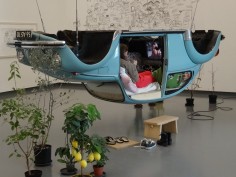Surasi Kusolwong
Naked Machine

source: artpaceorg
Surasi Kusolwong was born in 1965 in Ayutthaya, Thailand. In 1987 he received his BFA from Silpakorn University, Bangkok, Thailand, and in 1993 he received his MFA from Hochshule für Bildender Künst, Braunshweig, Germany. Kusolwong’s artistic practice includes installation and performance-based work and, since 1996, he has concocted variations on market settings where inexpensive, mass-produced, Thai-manufactured goods are sold for a nominal fee.
The artist has shown widely in Europe, America, Asia, and Australia. Solo exhibitions include Institute of Visual Arts (INOVA), Milwaukee, WI; Arte all’Arte (Arte Continua project), Casole d’Elsa, Italy; Fri-Art Centre D’Art Contemporain Kunsthalle, Fribourg, and Art & Public Gallery, Geneva, Switzerland. Group exhibitions include P.S.1 Contemporary Art Center, Long Island City, NY; Hayward Gallery, London, England; Kiasma Museum of Contemporary Art, Helsinki, Finland; Academia de Francia/Villa Médicis, Rome, Italy; 21st Century Museum of Contemporary Art, Kanazawa, Museum of Contemporary Art, Tokyo, Japan; Pusan Metropolitan Museum of Art, Samsung Museum of Modern Art, Seoul, Korea; Edsvik Art & Culture Center, Sollentuna, Sweden. Kusolwong has exhibited in many biennales including the 2001 Berlin Biennale, Germany; Transfert, 2001 Swiss Sculpture Exhibition, Biel, Switzerland; Kwangju Biennale 2000, Korea; Taipei Biennale 2000, Taiwan; Third Asia-Pacific Triennial of Contemporary Art, Brisbane, 11th Biennale of Sydney, Australia; and the 1997 Vienna Secession, Austria.
Kusolwong was chosen for his ArtPace residency by Jérôme Sans, Independent Curator and Co-Director of the Palais de Tokyo, Paris, France. Sans is co-founder of the Palais de Tokyo, an innovative contemporary art exhibition space. He is also an adjunct curator at INOVA, the Institute of Visual Arts in Milwaukee, WI.
The artist lives and works in Bangkok, Thailand.
.
.
.
.
.
.
.
source: momaps1org
Surasi Kusolwong (Thai, b. 1965) makes installations and performances that reference consumer society and the economy. Through his participatory and interactive works the Bangkok-based artist encourages social interaction over economic exchange. His large-scale installation Golden Ghost (The Future Belongs To Ghosts) (2011), which was first presented in the Creative Time exhibition Living as Form, invites visitors to enter into the vast field of industrial thread waste to search for gold necklaces hidden in the piles of cotton. Visitors who are fortunate enough to find a necklace are welcome to keep it. The work suggests a sense of play in which visitors can climb the mounds of thread waste, comb through the material and explore. While the literal treasure hunt in a field of excess serves as a metaphor for consumption at the global and individual level, it also inverts standard systems of exchange—the expensive gold necklaces are not sold nor bartered, but generously given away.

